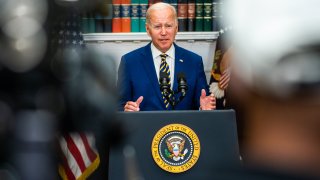
- The Biden administration said in a new court filing that it will ask the Supreme Court to lift an injunction and allow a major student loan debt relief program to resume.
- The filing came three days after a federal appeals court in St. Louis issued a nationwide injunction temporarily barring the program.
- That ruling by the appeals court was the latest in a series of legal challenges to President Joe Biden's plan to cancel up to $20,000 in student debt for millions of Americans.
The Biden administration said in a new court filing Thursday that it will ask the Supreme Court to lift an injunction and allow a major student loan debt relief program to resume.
Watch NBC6 free wherever you are
>The filing came three days after the federal appeals court for the 8th Circuit in St. Louis issued a nationwide injunction temporarily barring the program.
That ruling by the appeals court, which will be the target of the planned request to the Supreme Court, was the latest in a series of legal challenges to President Joe Biden's plan to cancel up to $20,000 in student debt for millions of Americans.
Get local news you need to know to start your day with NBC 6's News Headlines newsletter.
>The Biden administration stopped accepting applications for its relief earlier in the month after a federal district judge in Texas struck down its plan last week, calling it "unconstitutional."
The court filing on Thursday asked the federal appeals court for the 5th Circuit to stay the Texas judge's order pending an appeal by the Department of Justice of the ruling. The filing says the judge "lacked jurisdiction to enter an order."
And the filing says, "the government will be filing an application with the Supreme Court to vacate a separate injunction against the [Education] Secretary's action entered by the Eighth Circuit earlier this week."
Money Report
Earlier Thursday, the Biden administration revealed updated guidelines that will make it easier for those struggling with their student debt to discharge it in bankruptcy.
In the case at issue in the 8th Circuit, another federal judge rejected the challenge to the debt relief program brought by the six states — Nebraska, Missouri, Arkansas, Iowa, Kansas and South Carolina, The judge ruled that while the states raised "important and significant challenges to the debt relief plan," they ultimately lacked legal standing to pursue the case.
Standing refers to the idea that a person or entity will be affected by the action they seek to challenge in court.
The GOP-led states appealed after their lawsuit was denied.
A three-judge panel on the 8th Circuit then ruled Monday that Missouri had shown a likely injury from the administration's program, pointing out that a major loan servicer headquartered in the state, the Missouri Higher Education Loan Authority, or MOHELA, would lose revenue under the plan. Missouri's state treasury department receives money from MOHELA.
The Biden administration has defended the legality of its plan and vowed to keep fighting the challenges.
"We believe strongly that the Biden-Harris Student Debt Relief Plan is lawful and necessary to give borrowers and working families breathing room as they recover from the pandemic and to ensure they succeed when repayment restarts," Education Secretary Miguel Cardona said in a statement.
"Amidst efforts to block our debt relief program, we are not standing down."
A top official at the U.S. Department of Education recently warned that there could be a historic rise in student loan defaults if its forgiveness plan is not allowed to go through.
"These student loan borrowers had the reasonable expectation and belief that they would not have to make additional payments on their federal student loans," U.S. Department of Education Under Secretary James Kvaal wrote in a court filing.
"This belief may well stop them from making payments even if the Department is prevented from effectuating debt relief," he wrote.
"Unless the Department is allowed to provide one-time student loan debt relief," he went on, "we expect this group of borrowers to have higher loan default rates due to the ongoing confusion about what they owe."






